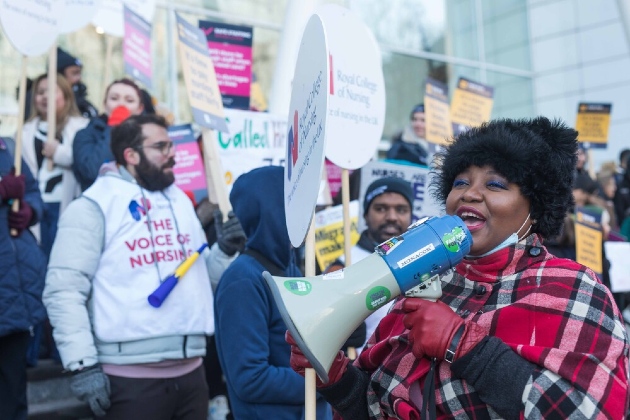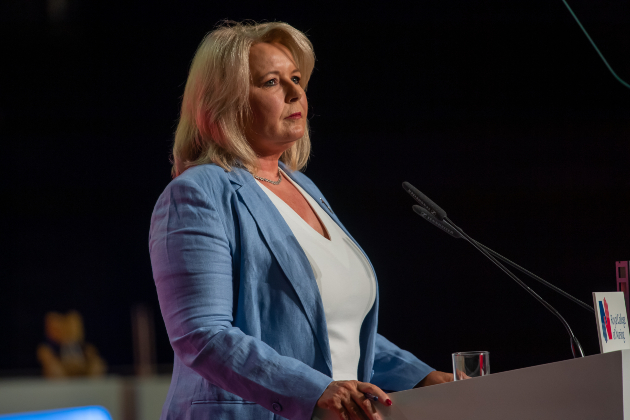Nestled among the shops, bars and gay clubs of London’s bustling Soho district lies 56 Dean Street, Europe’s largest sexual health clinic. It employs more than 60 nursing staff and sees 12,500 patients a month. The clinic provides advice and treatment for a range of sexually transmitted infections but it’s become renowned for its groundbreaking work preventing the spread of HIV. It has reduced the number of new diagnoses of HIV by a staggering 80% in the last two years.
“This is historic,” says Leigh Chislett, the clinic manager. “Thirty years ago there was no treatment and people diagnosed with HIV who developed AIDS were dying within two years. Now they can live long and healthy lives. If you’d told me back in the 80s that you could take a pill to prevent HIV, I would never have believed you. The progress that’s been made is mindblowing.”
Sex without fear
The pill Leigh refers to is pre-exposure prophylaxis or PrEP. Taken correctly, either every day for continuous protection or intermittently, a few hours before having sex and for at least two days after, it provides a very good defence against catching HIV. Though it’s been approved for use in America since 2012, it’s only become widely used in the UK in the last couple of years.
“It’s been a game-changer for many gay men,” says Leigh. “I spoke to a man in his 50s a few weeks back and he said that, with PrEP, he’s been able to have sex without fear for the first time in his life.”
PrEP is not yet available on prescription from the NHS but can be bought online for as little as £35 a month. However, a new clinical trial is offering hope to many people who want to proactively protect themselves from contracting HIV.
The trial, launched by NHS England in October, lasts three years and aims to recruit 10,000 at risk people to take PrEP. 56 Dean Street has 1,700 spaces on that trial and already has a hefty waiting list. “It’s our hope that the evidence in favour of continued access to free PrEP is so compelling that it becomes available on the NHS in future,” says Jon Clark, a charge nurse at the clinic.
For nurse practitioner Joe Phillips, the arguments for its continued free availability are clear. “It costs up to £600 a month to provide treatment for someone who is HIV positive,” he says. “When I first started working here four years ago, I was diagnosing multiple people a day with HIV. That has dramatically dropped with PrEP. Last month we tested just 10 people as being HIV positive, 18 months ago that figure was 77 a month.”
 Nurse practitioner Joe Phillips provides advice to a patient
Nurse practitioner Joe Phillips provides advice to a patient
Part of life admin
However, it’s not just PrEP for which the clinic owes its results. “We were seeing a decline in new cases of HIV even before the drug was widely available,” says Joe.
The tailored treatment advice and accessibility of the service have also played their part. At Dean Street Express, the sister clinic to 56 Dean Street, the latest technology is being used to make screening easier than ever, with touchscreen check-in, self-taken tests, fast bloods and results delivered by text in just six hours.
“We’re changing the way people think about getting tested,” says Jon. “Before it might have seemed like an ordeal, needing to travel out of town to a clinic, sit nervously in the waiting room for hours and leave not knowing for weeks whether you were clear. With the services we offer, getting tested is becoming part of modern life. Gay guys come to Soho to meet friends for drinks, get tested then go on for something to eat. There’s no stigma to it. It’s part of life admin."
The location of the clinic is crucial to its success. Though he’s too humble to admit it, the move to Soho was Leigh’s idea and he spent a year on secondment setting up 56 Dean Street before it opened in 2009. The sleek shop front, sophisticated interior (pictured above) and professional treatment rooms are a far cry from sexual health clinics “hidden away in basements” that he recalls from years gone by.
“We fought very hard for this,” he says. “People with HIV or people getting screened should not be hidden. I refuse to play into that shame. The clinic’s previous location in Victoria was no longer fit for purpose and I got so frustrated and angry about that. Moving here was a deliberate plan.”
It’s this passion, perhaps, that has come to personify 56 Dean Street. Its innumerable outreach programmes, community initiatives and psychosexual services have all, it seems, been initiated by forward-thinking staff.
The Prime service, for example, has been running for 18 months and seeks to look more broadly at the wellbeing of gay men with a view to encouraging them to make healthier choices in sex and relationships. “It’s not a patronising service,” Leigh says. “It’s about empowering people, providing guidance based on their particular needs and setting realistic goals. Tackling HIV requires a multi-pronged attack.”
“We find that most gay men are relatively well-informed about having safe sex,” adds Jon, “but that doesn’t necessarily lead to informed behaviour. There’s lots of emotional and psychological factors at play.”

Joe, whose role involves providing mental health care for men who have HIV and hepatitis C, strongly agrees. “It’s so important that we offer that psychological support,” he says. “For some men, just giving them the opportunity to talk provides tangible relief. You see them physically relax and you know that, in that moment, you’ve helped make them feel better.”
That’s why some of the more innovative approaches to holistic health care at 56 Dean Street are proving so popular. A few months ago, a drama therapy group exploring issues of loneliness and isolation ran by the clinic was massively oversubscribed.
“I’m very fortunate to have staff who feel so passionately about what we’re trying to do here,” says Leigh. “It’s often patients who indicate what we need to do next, and the staff work with them to bring those ideas to life.”
I'm very fortunate to have staff who feel so passionately about what we're trying to do here
Leigh refers specifically to CliniQ, a sexual health and wellbeing service for trans people and their partners. “Trans people remain one of the most discriminated groups of people in society and they often report negative experiences of health care,” he says. “Up to 48% of trans people have attempted suicide at least once. CliniQ has been a phenomenal success and was created and led by the trans community. We had a young trans man walk on the London Pride march with us and he said it was the happiest day of his life.”
Treatment as prevention
For those who do test positive for HIV, quick treatment is a priority. Starting antiretroviral therapy as soon as possible results in better long-term health outcomes and lowers the levels of HIV in the blood. Once those levels are “undetectable”, the chance of passing on the virus is zero.
“I recently diagnosed a gay sex worker as HIV positive,” says Jon. “He started treatment the same day and returned a month later for follow-up bloods. His HIV levels came back undetectable. There is every chance he’ll go on to have a normal lifespan, in fact he may even live longer as he’ll be having regular health checks.”
So what next for 56 Dean Street? Well, not content with cutting its rate of new HIV diagnoses by 80%, it’s launched a campaign called Plan Zero, to try to prevent the spread of HIV completely.
Is it achievable? “Yes,” Jon says with conviction. “If we can find and test everyone who has HIV, get them on treatment quickly and provide PrEP to those at high risk, we can bring down this virus. While there’s that 20% left to tackle, we have to have that goal. We know how to do it and we can do it.”
Challenges and rewards
The three nurses interviewed each have their own reasons for pursuing a career in HIV nursing and have different perspectives on what they consider to be the challenges and rewards.
For Leigh (pictured), it was an encounter with a patient who had AIDS back in the 80s that struck a chord with him. “We were beginning to hear about this cancer and unusual infections that were affecting gay men in America. The first patient I cared for with AIDS was in 1986. He offered me some of his food that his partner had brought in for him. He became very emotional when I accepted because he had felt no one wanted to go near him. I decided there and then that I wanted to do something to help.”
More than 30 years later, Leigh has some hard and also heartening stories to tell. From the “really frightening” deaths he experienced working on an HIV inpatient ward, to the bodies of three young men he laid out on his last shift and to the man who recognised him 18 years on from being diagnosed and thanking him for helping him “survive”. “It’s been tough”, Leigh admits, “but a privilege and life inspiring.”
It’s been tough, but a privilege and life inspiring
For Joe, it was the voluntary work he did supporting children with HIV in Africa following his first degree that provided the turning point. “I decided I wanted to train as a nurse and treat people with HIV back here,” he says. “It’s proved to be a great area of nursing to be in. Challenging and hard work but you can’t help but be passionate about it.”
That sentiment is shared by Jon who dropped two NHS pay grades to join the team at 56 Dean Street. He worked in A&E for 10 years prior to that, and despite the £10,000 reduction in salary, has never looked back.
“As a gay man, the prospect of working here appealed to me,” he says. “Though I had never been to the clinic, I had heard great things about it and I wanted to work in the best place I could.
“Here things really are patient led, whereas in other places they’re just buzz words that don’t really mean anything. It’s inspiring to have nurses around you who feel so passionate and you find yourself wanting to be part of that.”
As for the challenges, it’s the time constraints of working for such a busy service that cause Jon frustration. “But you have to trust that you’ve done enough in that one visit for them to come back again,” he says. “For me, it’s the impact you can have on people’s lives that is the biggest reward. There’s a skill in being able to talk to people about such intimate issues and get them to open up so you can treat them in the best way you can. It’s about developing trust and communicating with people on a very human level. I had more ‘thank yous’ in my first week at 56 Dean Street than I had in 10 years of working in A&E.”
Showing solidarity
takes place on 1 December each year. It’s an opportunity for people worldwide to unite in the fight against HIV, to show support for people living with HIV, and to commemorate those who have died from an AIDS-related illness. Founded in 1988, World AIDS Day was the first ever global health day.
Find out more
56 Dean Street is part of Chelsea and Westminster NHS Foundation Trust. Find out more about its services and the Plan Zero campaign on its .








